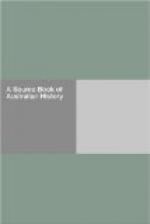THE DIGGINGS
Of the history of the discovery of gold in Australia I believe few are ignorant. The first supposed discovery took place some sixty years ago at Port Jackson. A convict made known to Governor Phillip the existence of an auriferous region near Sydney, and on the locality being examined particles of real gold-dust were found. Every one was astonished, and several other spots were tried without success. Suspicion was now excited, and the affair underwent a thorough examination, which elicited the following facts: The convict, in the hope of obtaining his pardon as a reward, had filed a guinea and some brass buttons, which, judicially mixed, made a tolerable pile of gold-dust, and this he carefully distributed over a small tract of sandy land. In lieu of the expected freedom, his ingenuity was rewarded with close confinement and other punishments. Thus ended the first idea of a gold-field in these colonies.
Suddenly, in 1851, at the time that the approaching opening of the Crystal Palace was the principal subject of attention in England, the colonies of Australia were in a state of far greater excitement; as the news spread like wildfire, far and wide, that gold was really there. To Edward Hammon Hargreaves be given the honour of this discovery. This gentleman was an old Australian settler, just returned from a trip to California, where he had been struck by the similarity of the geological formation of the mountain ranges in his adopted country to that of the Sacramento district. On his return he immediately searched for the precious metal; Ophir, the Turon, and Bathurst well repaid his labour. Thus commenced the gold-diggings of New South Wales.




